November 25th, 2014 § § permalink
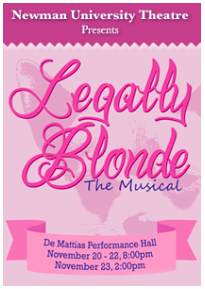 To say that Newman University’s production of the musical Legally Blonde was performed with its book and lyrics intact this past Saturday and Sunday would seem to be a wholly unremarkable event. But because that wasn’t the case at Thursday and Friday’s shows, the fidelity of the latter two performances is rather more intriguing. How did a university production suddenly shift away from censorship halfway through a four performance run? How, to paraphrase a lyric from The Producers, did Legally Blonde go right?
To say that Newman University’s production of the musical Legally Blonde was performed with its book and lyrics intact this past Saturday and Sunday would seem to be a wholly unremarkable event. But because that wasn’t the case at Thursday and Friday’s shows, the fidelity of the latter two performances is rather more intriguing. How did a university production suddenly shift away from censorship halfway through a four performance run? How, to paraphrase a lyric from The Producers, did Legally Blonde go right?
* * *
Newman University in Wichita, Kansas is a Catholic school with an undergraduate enrollment of 2,795, according to data from the U.S. News and World Report online rankings. It was founded by a religious order, the Adorers of the Blood of Christ as a women’s college in 1933, becoming co-ed in 1965.
The theater program at Newman is in just its fourth year. It was only in 2013 that students could declare as theatre majors, and the program currently has 18 majors and 12 minors. The school boasts two theatres and the theatre program produces four shows each year. Past productions include Lend Me A Tenor, Iphigenia in Aulis and in Taurus, Measure For Measure, and this fall’s Buried Child. Director of Theatre Mark Manette notes that there have been some rumblings about the content of some of the department’s productions in the past, including sexual content in Tenor and Pippin, citing one 2012 letter to the school newspaper saying that the school was producing plays with “a heaping helping of sexual innuendo.”
In announcing Legally Blonde, Manette felt he was choosing a mainstream, modern show for his students, aware that it is one of the most popular musicals in high school theatre. Save for making some very minor script emendations – “god damn” is a problem at a faith-based university, for example – the show went into rehearsals using the script as written. In the words of senior C.L. Smet, a theatre major who was cast as Paulette, “There were very light hints of censorship early on, but only the type of things that we are used to. In most shows we are asked to take out all instances of using the lord’s name in vain because we go to a Catholic university.”
* * *
Manette’s purview over the theatre department does not require him to submit his play selection for approval to the university. But with rehearsals underway, he was called to the Provost’s office on November 6, in order to address rumors that had begun to swirl about the content of Legally Blonde.
“When I was called into the office I was told that our production featured live masturbation, drug use, and two guys kissing,” said Manette. “My response was that the show features none of these things. But the seed of the rumors could be traced to the two changed lines: ‘Masturbatory emissions’ and ‘Get you high and laid’.”
Although Manette clarified the show’s content, he was still asked to make changes to the script. “I was told that I had to make the changes or else,” said Manette. “I did send a letter to the Provost stating that I had signed a contract not to make any changes to the script. He took that up the ladder, so to speak, and told me to go forward with making changes.”

C.L. Smet and Trevor Farney in Legally Blonde at Newman University (Photo courtesy of Newman University)
According to Smet, “Nothing seemed weird until a few days before tech week started, when individual cast members started being pulled aside and told that we had to change lines. For instance, my line ‘What’s she got that you don’t got, three tits?’ had to be changed to ‘three boobs’ this was a very minor change compared to many others but was still frustrating and unnecessary right before tech week. We were told by our director, music director, and the head of our department that these changes were from the administration directly. We were told that several higher-ups…were lodging complaints about the content.”
“We were also told repeatedly not to raise hell about the issue, because if we were to dig too deep we might cause more harm than good,” Smet related. “Obviously, however, we decided to pursue the matter. I was one of the loudest about my disappointment with the administration. I attempted to have a meeting with the President of our college. However, when I told them it was regarding Legally Blonde censorship, I was told she ‘didn’t speak to students,’ which I find very hard to believe. Many other students were confused and bothered by the censorship. A few of them were willing to just lay low and let it pass, but most of my fellow theatre majors saw the utter illegality of the changes and wanted to do something to help. Apart from the legal issues, many students were just sad that at the college level we were expected to perform a watered-down play, as if the world would end if somebody say “masturbate” on stage. It was a very frustrating and confusing time for everybody involved.”
* * *
 On the evening of the first performance, the school newspaper, The Vantage, published its weekly print edition with a lead story on the censorship of the Legally Blonde text. The story was assigned by the paper’s editor-in-chief, senior Matt Riedl – who happened to be a member of the Legally Blonde ensemble.
On the evening of the first performance, the school newspaper, The Vantage, published its weekly print edition with a lead story on the censorship of the Legally Blonde text. The story was assigned by the paper’s editor-in-chief, senior Matt Riedl – who happened to be a member of the Legally Blonde ensemble.
“It was my decision as editor-in-chief to pursue the story,” said Riedl. “It wasn’t something that was being brought out by the administration. We thought it was our responsibility. Every viewpoint can be voiced. There had been a few voices that had been pro-censorship, but we thought it was important that every viewpoint be represented.”
The story by Delaney Hiegert, ran with the headline “Legally Blonde Censorship Rankles Cast Members,” as well as a subheadline, “Illegally Changed?” It cited Provost Michael Austin confirming that the show would be a censored version.
There were at least six lyric changes to the musical, as well as multiple dialogue changes, in order to make the play more appropriate for all audiences, he said. The changes involved taking out any sexually derogatory remarks, references to sex and drugs, any use of the word “Christ,” and most all cursing.
For instance, Elle Woods’ line “masturbatory emissions” has been changed to “accidental emissions,” and Professor Callahan’s line, “Get you high and laid,” has been changed to “Get you entertained.”
“When we do plays, we are inviting not just the campus, but the community to come watch,” said Austin. “We have to be very careful to represent the values of the institution.”
The Vantage article spoke not only to the changes to Blonde, but the greater potential impact of the censorship on the theatre program. Quoting freshman Trevor Farney:
“I loved being a part of Buried Child. I love the directors and the people I’ve gotten to work with,” Farney said. “But I don’t want to act in something that’s just going to be a watered-down version of what it should be. In Legally Blonde, the censorship is annoying but it doesn’t hurt the production that much. But if the censorship continues, I don’t even know if I’d want to stay in the program. And that’s a shame.”
The Vantage story made the alteration of the Blonde script a campus-wide issue. Riedl cited that the piece received 1500 page views on the paper’s website, in contrast to the prior month’s top story, which had only 700. He noticed that in some places, in particular the theatre’s lobby, someone had flipped the papers upside down in their racks, so that the headline wouldn’t show. He said that his girlfriend reported sitting in the theatre pre-show and watched as many people read the paper’s front page.
“The article in the Vantage was huge,” said Smet. “It had a massive impact around campus and the entire Wichita theatre community. The outpouring of support was awesome, and it encouraged the cast to continue fighting.”
* * *

Legally Blonde at Newman University (Photo courtesy of Newman University)
The first two performances of Legally Blonde at Newman contained the mandated cuts and substitutions imposed by the administration. But C.L. Smet says that change was already afoot.
“Once the Vantage article was published, cast members became even more open about not being okay with the censorship,” Smet said. “For our Saturday performance we returned 100% to the written word of the script – we did the play that was actually written. We joked that it was the first Legally Blonde performance we’d done, and after the show we all had a group bonding moment celebrating the uncensored show.”
Riedl described the decision in similar terms. “We decided to perform the musical in its full uncensored form on Saturday and Sunday,” he said. “It was kind of a group decision. We had a little meeting before our performance on Friday and we talked about it. The coverage was getting so widespread and everyone was talking about it so we decided we weren’t going to put up with it any longer. We were going to subvert the order to change.”
The student motivated changes don’t precisely jibe with the account from Provost Michael Austin.
“We ended up not making the changes,” said Dr. Austin. “They went on according to script. We looked at what might be possible but decided that we’d do it the way it was in the script.”
Austin did say that the issue was a major one for the school, saying it was “hotly debated and discussed.” He said that he attended the show on Sunday and that the show was performed as written, but could not speak to whether the complete text was in use at all performances.
Riedl professed surprise when informed that the administration had withdrawn its requests for text changes. “Really? That’s interesting,” he said. “Because I was under the impression it was a cast decision. There’s definitely some confusion there. I had not heard that. That’s very interesting.”
Riedl went on to recount a moment during the Saturday night show, during the song, “Blood in the Water.” “‘Get you high and get you laid’ was supposed to ‘get you entertained,’ he recounted. “From the stage, I heard someone whisper, ‘I thought that was supposed to be censored.’ It took some power to not break character from that.”
With somewhat conflicting stories about how the show was restored to its original text, Manette seemed to walk a careful line about what had taken place. He ascribed the choice to the students, noting that, “The people who had called for the censorship were not the ones behind the decision to do the show as written.”
* * *
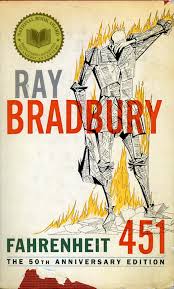 The issue of censorship is not an off-limits topic on the Newman University campus. It’s worth noting that all freshman this year were assigned to read Ray Bradbury’s Fahrenheit 451, the now classic novel in which censorship is taken to its ultimate extreme, with all books being sought out and burned by “fireman,” forcing lovers of knowledge into clandestine circles designed to preserve knowledge and texts.
The issue of censorship is not an off-limits topic on the Newman University campus. It’s worth noting that all freshman this year were assigned to read Ray Bradbury’s Fahrenheit 451, the now classic novel in which censorship is taken to its ultimate extreme, with all books being sought out and burned by “fireman,” forcing lovers of knowledge into clandestine circles designed to preserve knowledge and texts.
“There is artwork all over the building regarding censorship related to that novel,” Manette said. “Most members of the faculty and audience were appalled at the idea of censoring a production. Two pieces of art work across from the entrance of the theatre were mysteriously taken down on opening night – one was a nude – and they were miraculously replaced after the show closed. Coincidental?”
Smet told a similar story. “There was a great deal of other censorship happening in our arts department — nude paintings and “controversial” art work were removed from the hallways against the art department’s will. The entire fine arts sector of Newman was upset that they were being censored. Many people told us they supported us ‘fighting the power’.”
* * *
It’s unclear precisely where the complaints about Legally Blonde began and it’s also not certain exactly when or if approval was given to perform the show as written, as it was at the latter two performances. Precisely who in the administration really wanted the show edited remains somewhat vague, and no one with direct knowledge would speak to it on the record. But certainly the students took matters into their own hands, perhaps with the tacit approval of some members of the school administration.
Dr. Austin was quite clear about lessons learned from the imbroglio.
“Generally, I can say that the incident was not handled well,” he wrote to me, “for which I take full responsibility. We will not be suggesting changes to plays in the future, nor do we have any plans to exercise prior restraint on plays chosen by the Theatre Department.”
Austin’s statement is very encouraging, suggesting that Mark Manette will be able to continue to build Newman University’s theatre department and give his students the opportunity to work on a wide range of shows – as they were written. For the staff of The Vantage, they’ve gotten proof of the power of independent journalism to foster change. As for the cast of Legally Blonde? They’ve demonstrated that the words spoken on a stage matter, and that the words of authors come first.
* * *
Note: interviews for this article were conducted through a combination of voice interviews and e-mail correspondence. The word “said” may apply to both voice and e-mail communications.
November 24th, 2014 § § permalink

Benedict Cumberbatch in The Imitation Game
As prestige movies open pell-mell in the next few weeks, and Oscar campaigns already underway blaze into full public awareness, one of the contenders will surely be The Imitation Game, starring Benedict Cumberbatch and Keira Knightley. It tells the story of Alan Turing, the British mathematician who is widely credited with breaking the Nazi’s “Enigma” code and whose name is regularly invoked in discussions of artificial intelligence, specifically over how or whether we might one day create a machine whose thoughts are indistinguishable from those of a human.

Alan Turing
As with any major film, especially one with Oscar hopes, there will be a near-avalanche of stories about the film: its director, its stars, its writer – and the man who inspired it. I don’t want to give much away for those unfamiliar with the tale, but Turing’s life truly encompassed World War II intrigue, intellectual triumph, reprehensible bias, persecution and injustice, and great tragedy. There’s going to be a cottage industry of stories on Turing – paeans, revisionist history, alternative views, and so on, right up through Oscar night.
For many, this may be their first encounter with the Turing story and they’ll be drawn in by the considerable glamour and talent of Cumberbatch and Knightley (I haven’t seen it yet, so I’m going solely on the advance word and promotion). There’s a cautionary part of the story that’s well worth being told many times over.

Broadway logo for Derek Jacobi in Breaking The Code
But for theatregoers with moderately long memories (I count myself among them), The Imitation Game will come as something less than a revelation historically, because the West End and Broadway beat the movies to the punch almost 30 years ago, with Derek Jacobi as Turing in Hugh Whitemore’s play Breaking The Code. Like The Imitation Game, it was based on Andrew Hodges’s book Alan Turing: The Enigma.
Breaking The Code played for six months in New York 1987-88, following on the heels of Jacobi’s triumphant performances in the Royal Shakespeare Company’s repertory of Cyrano de Bergerac and Much Ado About Nothing (both opposite Sinead Cusack); I was fortunate enough to have seen all three, and it cemented my deep admiration for Jacobi as one of the finest actors of his generation. As for the play, while I long believed that it was Jacobi who truly made the experience remarkable, and unrepeatable, I saw the show years later at the Berkshire Theatre Festival with Jamey Sheridan in the Turing role, and to my surprise I was once again fascinated and deeply moved.
Now of course vastly more people see most movies than see a play, but as Imitation Game launches, I was thrilled to discover that Jacobi’s performance has been preserved, in a 1996 BBC adaptation of the play by Hugh Whitemore, available online in its entirety.
https://www.youtube.com/watch?v=S23yie-779k
While it is an adaptation, not simply a film of the play, the TV version will give us a chance to see two portrayals of one man by two superb actors, refracted through the views of different writers and directors – and societal growth and change regarding LGBTQ life and rights – at an interval of 30 years.
November 20th, 2014 § § permalink
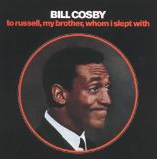 A couple of years ago, in conversation with a childhood friend on Facebook, we began recalling the hours spent in my basement listening to the early comedy records of Bill Cosby. Suddenly, a business associate from my adult life joined in, demanding to know how we could reminisce about this, given the many allegations made against Cosby, and the one out-of-court settlement, regarding his sexual assaults on women. Because the dialogue was focused on fond memories, not Cosby himself per se, and because this associate wouldn’t let it go, I unfriended him. I did so despite the fact that I knew of the charges, believed them, and had already ceased to enjoy Cosby’s new work. At that moment, however, I just wanted reverie.
A couple of years ago, in conversation with a childhood friend on Facebook, we began recalling the hours spent in my basement listening to the early comedy records of Bill Cosby. Suddenly, a business associate from my adult life joined in, demanding to know how we could reminisce about this, given the many allegations made against Cosby, and the one out-of-court settlement, regarding his sexual assaults on women. Because the dialogue was focused on fond memories, not Cosby himself per se, and because this associate wouldn’t let it go, I unfriended him. I did so despite the fact that I knew of the charges, believed them, and had already ceased to enjoy Cosby’s new work. At that moment, however, I just wanted reverie.
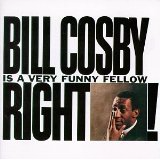 I did not then, nor do I now, countenance any of the actions with which Cosby is charged. I abhor them. I feel deeply sympathetic towards, and supportive of, any woman who may have been harassed, drugged or assaulted by him. I wish that he could stand trial for what he’s been accused of, so that he could be tried in the judicial system and not solely in the media. This is a case in which justice will likely never be done, in which there will always be unanswered questions – especially from Cosby himself, whose silence, as they say, speaks volumes.
I did not then, nor do I now, countenance any of the actions with which Cosby is charged. I abhor them. I feel deeply sympathetic towards, and supportive of, any woman who may have been harassed, drugged or assaulted by him. I wish that he could stand trial for what he’s been accused of, so that he could be tried in the judicial system and not solely in the media. This is a case in which justice will likely never be done, in which there will always be unanswered questions – especially from Cosby himself, whose silence, as they say, speaks volumes.
 But I can’t deny how much Cosby’s comedy meant to me in my youth. Long-unseen friends recall it readily at a distance of 40 years. The only time my brother and I came together peacefully as kids was to listen to comedy recordings, which we committed to memory. Later, when I lived with my parents for a year post-college, my family gathered in the room in our house where my godmother spent the final year of her life, promptly at 8 pm on Thursday, to watch The Cosby Show.
But I can’t deny how much Cosby’s comedy meant to me in my youth. Long-unseen friends recall it readily at a distance of 40 years. The only time my brother and I came together peacefully as kids was to listen to comedy recordings, which we committed to memory. Later, when I lived with my parents for a year post-college, my family gathered in the room in our house where my godmother spent the final year of her life, promptly at 8 pm on Thursday, to watch The Cosby Show.
So what do I do with treasured recollections in which an alleged predator played a central role? How can I even remember the work with warmth – work which in and of itself seems timeless in much of the material – even as I disavow its creator?
 Audiences in England faced these same questions when the pedophilia scandal at the BBC arose, first over the late Jimmy Savile and a bit later over Rolf Harris. I followed those stories in horror and disbelief, though it was Harris whose work I actually knew: his novelty hit “Tie Me Kangaroo Down Sport” was a staple on the Dr. Demento radio show, another touchstone for me. In the case of Harris, who also became known as an artist, communities began removing his paintings and eradicating his murals. This is akin to what TV Land has just done by removing The Cosby Show from their line-up, to dissociate themselves from the now irrevocably tarnished brand and likely because no advertiser would accept the association. But in each case, those who were entertained, unknowing, must reconsider their relationship, to the men, and to the work. Let’s not forget that Stephen Collins, who portrayed the father on the popular family drama 7th Heaven, is under scrutiny for what appears to be self-admitted incidents of child abuse, surfaced during his contentious divorce proceedings.
Audiences in England faced these same questions when the pedophilia scandal at the BBC arose, first over the late Jimmy Savile and a bit later over Rolf Harris. I followed those stories in horror and disbelief, though it was Harris whose work I actually knew: his novelty hit “Tie Me Kangaroo Down Sport” was a staple on the Dr. Demento radio show, another touchstone for me. In the case of Harris, who also became known as an artist, communities began removing his paintings and eradicating his murals. This is akin to what TV Land has just done by removing The Cosby Show from their line-up, to dissociate themselves from the now irrevocably tarnished brand and likely because no advertiser would accept the association. But in each case, those who were entertained, unknowing, must reconsider their relationship, to the men, and to the work. Let’s not forget that Stephen Collins, who portrayed the father on the popular family drama 7th Heaven, is under scrutiny for what appears to be self-admitted incidents of child abuse, surfaced during his contentious divorce proceedings.
 In the cases of Savile, Harris, Collins and Cosby, the issue is criminal actions against others. Unconscionable. As an aside, it’s worth recalling that Paul Reubens was immediately shunned two decades ago following his arrest for masturbating in a porn theatre – a crime, at odds with his role as a Saturday morning children’s performer, but in that case a victimless one. Though he managed to secure acting roles intermittently, it’s only in the past few years that his Pee Wee Herman persona has been publicly embraced once again. I wonder whether his resurrection would have been possible had his transgression occurred in the era of social media – or whether he might have been rescued by it. Certainly it is social media which has allowed the long-standing allegations against Cosby to engage the public consciousness at last.
In the cases of Savile, Harris, Collins and Cosby, the issue is criminal actions against others. Unconscionable. As an aside, it’s worth recalling that Paul Reubens was immediately shunned two decades ago following his arrest for masturbating in a porn theatre – a crime, at odds with his role as a Saturday morning children’s performer, but in that case a victimless one. Though he managed to secure acting roles intermittently, it’s only in the past few years that his Pee Wee Herman persona has been publicly embraced once again. I wonder whether his resurrection would have been possible had his transgression occurred in the era of social media – or whether he might have been rescued by it. Certainly it is social media which has allowed the long-standing allegations against Cosby to engage the public consciousness at last.
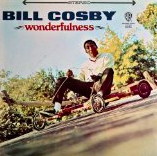 I could go underground with my appreciation of Cosby’s work, but that feels hypocritical. I cannot rewrite my past, even as it is – and should be – impossible to reconcile it with what has reemerged in the past few weeks, with greater traction than ever before. Given the enormous influence of The Cosby Show, I’m certainly far from the only person in this confused state; I suspect my affinity for the comedy recordings may be somewhat more rarified, especially among those younger than I am. No doubt I Spy and Fat Albert fans are experiencing profound dissonance as well. In fact, I hope they are.
I could go underground with my appreciation of Cosby’s work, but that feels hypocritical. I cannot rewrite my past, even as it is – and should be – impossible to reconcile it with what has reemerged in the past few weeks, with greater traction than ever before. Given the enormous influence of The Cosby Show, I’m certainly far from the only person in this confused state; I suspect my affinity for the comedy recordings may be somewhat more rarified, especially among those younger than I am. No doubt I Spy and Fat Albert fans are experiencing profound dissonance as well. In fact, I hope they are.
I normally write because I have something very specific I want to say. In this case, I write because I’m grappling with deeply conflicted feelings. What do we all do when our childhood heroes are alleged, or revealed, to be profoundly different from the work and personae for which they became famous? How do we stand with victims, and against all such crimes, yet harbor genuinely warm memories created by the same artist? I can rethink my feelings about Cosby the man, and I have, but I don’t know that I can rethink my childhood, and the role he played in it. Should I? Can you? And if we truly can’t, where does that leave us? Are we hypocrites, or dupes, or forever divided as truth intrudes, maybe forcing us to even rewrite our own memories.
Addendum, 5 pm, November 20: As I discuss this post on Twitter, Facebook and e-mail, another corollary presents itself, though its not as clearcut. Phil Spector was convicted of murder, yet no one seems to shun the classic records he made as a producer. Is it because he’s not the named artist, and so the line is less clear? But let’s remember, whatever Cosby has done, his alleged crimes aren’t Phylicia Rashad’s, or Lisa Bonet’s, or Robert Culp’s, and so on. Must their work be excised and shunned because of their co-star’s actions? For that matter, have people stopped watching the Police Squad movies because of O.J. Simpson? It may be difficult not to view them through the prism of true-life revelations, but there seem to be no correct or consistent actions or reactions.
November 8th, 2014 § § permalink
When the news hit on Thursday, it flew around the New York theatre community as quickly as the unexpected closing of a Broadway show.
The Cafe Edison on 47th Street is a fixture, one that opened in 1980, but seems as if it has been there much, much longer. From the moment people heard it was being evicted to make way for an upscale restaurant, mourning began (even though it will be around for another month or so), with theatre district denizens eulogizing it as one of the last vestiges of the “old” Times Square, more of a piece with Colony Records and Howard Johnson’s than American Eagle and the Build-a-Bear Workshop.
Others have written eloquent commemorations of a place not yet quite gone (Julie Klausner’s is startlingly similar to my own thoughts on both the restaurant and the announcement), so I won’t attempt to top any of them (I am on record in the New York Daily News). However, as some stalwarts organized before today’s matinee to rally against the decision by the owners of the space, which is part of the Edison Hotel, I felt the least I could do was to commemorate their demonstration of support.
If you’d like to sign a petition in support of the Cafe Edison, in hope of persuading the craven property owners to reverse their edict, click here for the official effort.

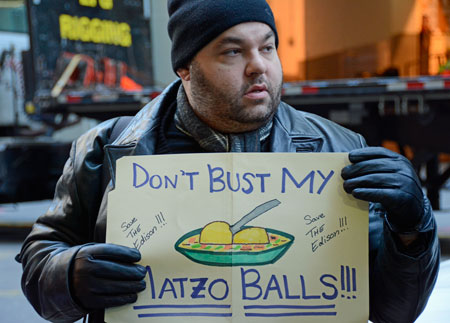

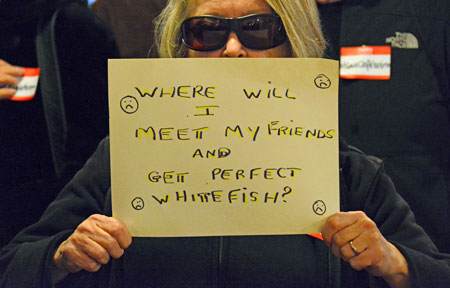
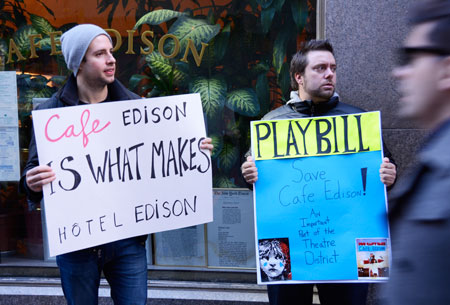
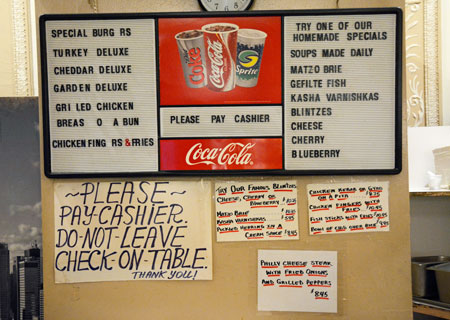
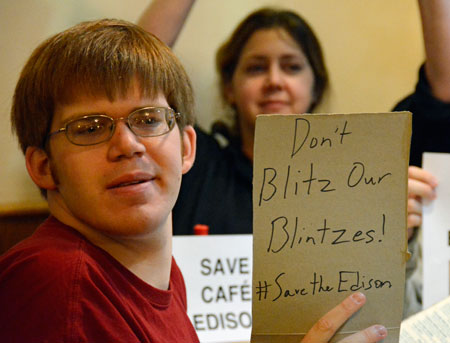

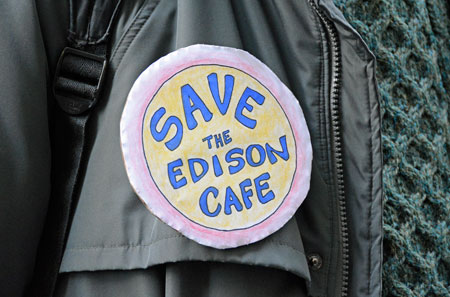


November 3rd, 2014 § § permalink
In the song “The Book Report” from the musical You’re A Good Man, Charlie Brown, Lucy van Pelt struggles to complete her homework assignment: 100 words on Peter Rabbit. Falling short, she concludes it thusly: “And they were very very very very very very happy to be home. The very very very end.”
 In honor of this blatant effort to reach a designated threshold without utilizing meaningful content, I would like to present the very very very first “Lucy Van Pelt Award for Verbal and Political Padding” to Senator Tom Coburn (R, Oklahoma), for the 2014 edition of his much-publicized “Wastebook.” For those who haven’t heard of it, the Wastebook is Coburn’s perennial compilation of excessive and/or unnecessary federal spending. It tends to generate a good bit of attention for its most absurd items in all manner of media. A careful parsing of Coburn’s annual lists may reveal a partisan bent and a truckful of snark, though in reviewing the past few years of reports, I did note that he wasn’t above calling attention to what he deemed wasteful spending in his home state too.
In honor of this blatant effort to reach a designated threshold without utilizing meaningful content, I would like to present the very very very first “Lucy Van Pelt Award for Verbal and Political Padding” to Senator Tom Coburn (R, Oklahoma), for the 2014 edition of his much-publicized “Wastebook.” For those who haven’t heard of it, the Wastebook is Coburn’s perennial compilation of excessive and/or unnecessary federal spending. It tends to generate a good bit of attention for its most absurd items in all manner of media. A careful parsing of Coburn’s annual lists may reveal a partisan bent and a truckful of snark, though in reviewing the past few years of reports, I did note that he wasn’t above calling attention to what he deemed wasteful spending in his home state too.
The new report, on its comic book meets tabloid cover, trumpets $25 billion in government waste in only 100 examples. Without being deeply grounded in every item he cites, I must admit that a few do make one wonder. However, I have to chide Coburn for a few of his 2014 examples, specifically those derived from National Endowment for the Arts grants. Alongside “Swedish Massages for Rascally Rabbits” and “Watching Grass Grow,” Coburn calls out:
- “Teen Zombie Sings, Tries To Get A Date To The Dance” ($10,000 for the musical Zombie in Love at Oregon Children’s Theatre)
- “Colorado Orchestra Targets Youth With Stoner Symphony” ($15,000 for a Colorado Symphony concert thematically linked to the state’s newly legal industry, but performing standard symphonic works)
- “Roosevelt and Elvis Make A Hallucinatory Pilgrimage To Graceland” ($10,000 to The TEAM for their play RoosevElvis, to be seen this winter at the COIL Festival)
- “Bruce Lee Play Panned As Promoting Racial Stereotypes” ($70,000 to Signature Theatre Company for the production of David Henry Hwang’s Kung Fu)

Libby King and Kristen Sieh in The TEAM’s RoosevElvis (Photo by Sue Kessler)
While Coburn surely hasn’t seen or read any of these productions, his efforts to make these minimal grants into shameful instances of government funds gone awry relies only on inevitably reductive synopses and selectively quotes from the odd negative review as if to justify his point about these NEA funded projects. The headlines are of course chosen to make the work itself sound as absurd as possible. Worth noting: Coburn seems to have a particular distaste for children’s theatre, having also called out $10,000 for the production of the musical Mooseltoe at the Centralia Cultural Society in Illinois in the 2013 Wastebook. There are other arts related items in the 2014 report, but they’re actually funded outside of the NEA, the largest being $90 million for the State Department’s Cultural Exchange programs, targeted by Coburn for a handful of unconventional performers he selected from a much larger pool, a rigged argument at best.
Coburn’s increased role as an arts critic is no doubt due to the mileage he got out of his 2013 list’s inclusion of a $697,000 grant to the theatre company The Civilians for their musical The Great Immensity, about climate change. Obviously the subject matter was a hot-button for the Senator, and I imagine that numerous arts groups must be envious of the sum (far in excess of what groups typically get from the NEA), but Coburn fails to take into account the respect accorded to the work of The Civilians in artistic circles – and arts groups should take note that the largesse came not from the NEA, but from the National Science Foundation, due to the specific subject. It may be a bigger and easier target for Coburn, but it’s not a worthy one.
Whatever the politics and bias behind it, I’m willing to grant that there’s some value in Coburn’s list, such as highlighting the famous Alaskan Bridge to Nowhere or calling out excessive spending on the incompetent overhaul of government computer systems. But his four NEA-based examples this year are simply padding, as they represent only 0.00042% of his report’s dollar total, but 4% of his report. It’s just another example of a politician attacking the arts as an easy target, when there are bigger and more essential fish to fry.

Cole Horibe in Kung Fu at Signature Theatre (Photo: Joan Marcus)
Regarding the four “wasteful” grants in question, I can offer a personal opinion on only one, namely Kung Fu, which was ambitious and perhaps not completely realized in its debut at Signature. But it was – and is – a worthy project by an artist whose work is always deserving of support. By the way, David Hwang has told me there’s more work to be done on the piece and he’s recently made public note of plans to remount it soon to implement further changes. When that happens, I’ll do my best to invite Senator Coburn to Kung Fu as my guest though he may be out of the public eye and not up to it – he’s leaving Congress at the end of the year for health reasons, and this year’s list may be his parting shot.
Of course, health permitting, Coburn could keep producing the Wastebook after leaving office, if he has a real commitment to exposing government waste. But I’m willing to bet that he won’t. Why do I say that? Because surely most people realize that his annual screed is produced by his staff, maybe even eager young interns, not by Coburn’s own personal research and writing efforts. Come to think of it, I wonder how much the Wastebook cost the U.S. taxpayer each year, in staff research and writing time? I suspect it’s more than the federal government gave to Mooseltoe.
P.S. Let’s all go see The TEAM’s RoosevElvis when it plays New York’s P.S. 122 in January 2015 and each decide for ourselves whether the $10,000 from the NEA was well spent. I, for one, wasn’t aware of the show, but I’m now looking forward to it. Gee, thanks Senator Coburn!
 To say that Newman University’s production of the musical Legally Blonde was performed with its book and lyrics intact this past Saturday and Sunday would seem to be a wholly unremarkable event. But because that wasn’t the case at Thursday and Friday’s shows, the fidelity of the latter two performances is rather more intriguing. How did a university production suddenly shift away from censorship halfway through a four performance run? How, to paraphrase a lyric from The Producers, did Legally Blonde go right?
To say that Newman University’s production of the musical Legally Blonde was performed with its book and lyrics intact this past Saturday and Sunday would seem to be a wholly unremarkable event. But because that wasn’t the case at Thursday and Friday’s shows, the fidelity of the latter two performances is rather more intriguing. How did a university production suddenly shift away from censorship halfway through a four performance run? How, to paraphrase a lyric from The Producers, did Legally Blonde go right?
 On the evening of the first performance, the school newspaper, The Vantage, published its weekly print edition with a lead story on the censorship of the Legally Blonde text. The story was assigned by the paper’s editor-in-chief, senior Matt Riedl – who happened to be a member of the Legally Blonde ensemble.
On the evening of the first performance, the school newspaper, The Vantage, published its weekly print edition with a lead story on the censorship of the Legally Blonde text. The story was assigned by the paper’s editor-in-chief, senior Matt Riedl – who happened to be a member of the Legally Blonde ensemble. The issue of censorship is not an off-limits topic on the Newman University campus. It’s worth noting that all freshman this year were assigned to read Ray Bradbury’s Fahrenheit 451, the now classic novel in which censorship is taken to its ultimate extreme, with all books being sought out and burned by “fireman,” forcing lovers of knowledge into clandestine circles designed to preserve knowledge and texts.
The issue of censorship is not an off-limits topic on the Newman University campus. It’s worth noting that all freshman this year were assigned to read Ray Bradbury’s Fahrenheit 451, the now classic novel in which censorship is taken to its ultimate extreme, with all books being sought out and burned by “fireman,” forcing lovers of knowledge into clandestine circles designed to preserve knowledge and texts.


























